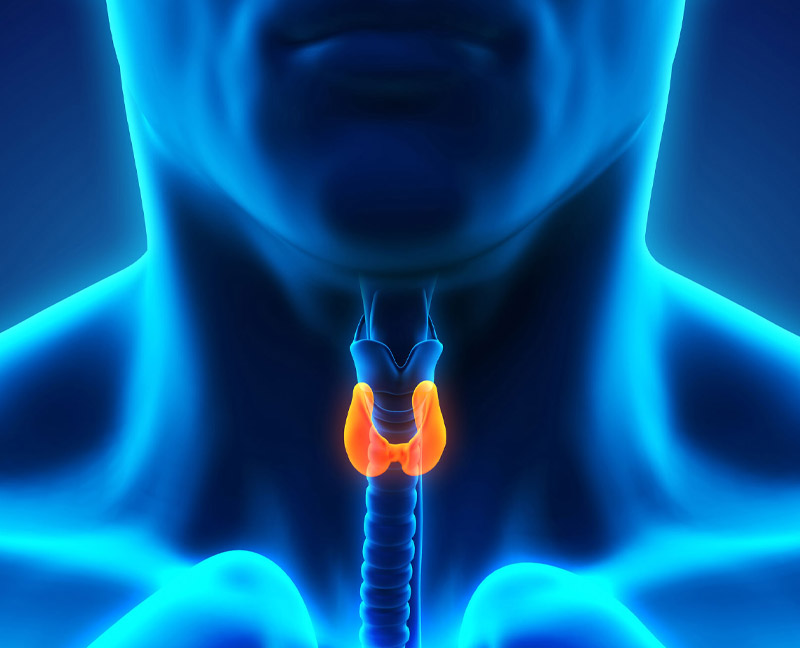Underactive or Overactive? Know the Symptoms of Thyroid Disease

Small but Mighty Thyroid
The thyroid gland sits at the front of the throat, and at roughly the size of your thumbs held together in the shape of a butterfly, it plays a large role in the body’s overall health.
What Does the Thyroid Do?
That small organ works with every organ in the body, according to Shore Physicians Group endocrinologist Dr. Matthew Corcoran. “In infants, the thyroid performs an essential function for growth and proper neural development. In adults the thyroid controls our metabolism and really impacts every organ in our body. From our heart to our gut, the thyroid plays a very important role by constantly releasing a steady amount of thyroid hormones into the bloodstream as our body needs it.”
How Do We Know We Have a Problem with Our Thyroid?
Dr. Corcoran said there are a variety of symptoms that signal something is off. For many, the symptoms are vague and non-specific. Patients will come to visit Dr. Corcoran with complaints of feeling sluggish, or they have noticed changes in their hair or their skin, depression, constipation, or may have concerns with weight management. “While these symptoms can mean different things, they can be symptoms of hypothyroidism, which is an underactive thyroid,” said Dr. Corcoran.
When the thyroid is overactive, or a condition known as hyperthyroidism, patients will come in with heart palpitations, tremors, and sweating, among other symptoms, according to Dr. Corcoran. He said both hyperthyroidism and hypothyroidism can present cognitive issues for patients, like problems focusing.
Causes of Thyroid Problems
Hashimoto’s disease is the most common cause of hypothyroidism, according to Dr. Corcoran. It is an autoimmune disorder where the immune system attacks the thyroid and can damage it, and the thyroid is not able to make enough of the necessary hormones and throws off the body’s metabolism.
Though there are multiple causes of hyperthyroidism, Grave’s disease is the most common cause of an overactive thyroid. Dr. Corcoran advised that Grave’s disease symptoms can be wide ranging because the thyroid works with so many other body systems. Patients will complain of irritability, anxiety, fatigue and frequent sleep disturbance. They may be concerned about weight loss despite not changing their normal eating habits. Women may have a change in their menstrual cycle and for men, erectile dysfunction and reduced libido can accompany hyperthyroidism.
Family Link
Anyone can develop Hashimoto’s disease but it occurs more often in women who have a family history of thyroid disease. Likewise, Graves’ disease is more likely discovered in women younger than 40. Both of the autoimmune disorders are linked to a family history of thyroid disease, according to Dr. Corcoran. “Anyone can have thyroid disease but we do see the family link as another important piece of the equation when diagnosing and choosing a treatment plan for our patients.”
Treatments
If the patient is diagnosed with Hyperthyroidism or an over active thyroid, they will be managed initially with medication that will slow it down. In the case of Hypothyroidism or an underactive thyroid, the patient can be managed with hormone treatment to speed it up. Whether that treatment will work to slow the thyroid down or help it to speed up, successful management of their thyroid disease is achievable.
Finding Nodules
“Sometimes in our exam we will find the patient has a nodule on their thyroid and we recommend further evaluation with ultrasound,” said Dr. Corcoran. But he added that many people have a nodule and never know it and it never gives them a problem. “Often nodules are discovered incidentally during imaging such as carotid artery Doppler studies,” said Dr. Corcoran. Of the nodules detected, the vast majority are benign with only 4-6 % cancerous.
Thyroid Cancer
While thyroid cancer numbers are increasing over the last few decades, according to Dr. Corcoran, it is something most patients do very well and thyroid cancer does not have to negatively impact their lifestyle.” He added that should a patient need surgical management or thyroid removal, they will usually do very well. The patient who has their thyroid removed will take hormone replacement for the rest of their lives.
Piecing Everything Together
Dr. Corcoran said because so many symptoms of thyroid disease are similar it takes a lot of understanding to find the best course of action for each patient. “Endocrinology is so appealing because it is a cognitive field where the physician and the health care team collect all the data and put all the pieces together like a puzzle to get the best outcome for each patient.”
Dr. Corcoran and the Endocrinology practice will open their new office at 18 New York Avenue in Somers Point on February 22, 2021. To make an appointment call 609-365-6328 or 609-365-5300.